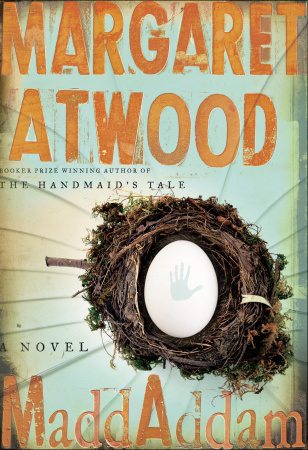By Jennifer Colbourne (Contributor) – Email
Print Edition: November 13, 2013
There is never so lethal a combination as when literature meets speculative fiction. In the Oryx and Crake trilogy, Margaret Atwood takes her talent for psychologically nuanced characters and combines it with a richly elaborate, all-too-plausible future. Although apocalyptic, the first two novels are largely set pre-apocalypse, but in the third and final novel of the trilogy, Atwood finally satisfies her readers’ curiosity as to the fate of the Crakers and the MaddAddamites.
It’s difficult to say whether or not Atwood was right in indulging her readers. Part of the beauty of Oryx and Crake was in the mystery of the unknown future world, of which Jimmy was only allowed a teasing glimpse. I’m not sure I blame Atwood for giving in to the, “But then what happens?” cry of her readers, but certainly the mystery is blown to pieces in the last novel.
Also, unlike the first novel, MaddAddam is far more black and white. It’s the good guys vs. the bad guys, the new world vs. the old world; which of these is preferable probably depends on one’s level of cynicism. It’s certainly difficult to find a hero in Oryx and Crake – there isn’t much redeeming about Jimmy/Snowman, and certainly not Crake. Oryx is more of a tragic figure, the ultimate victim of their twisted world. It’s depressing in its cruel realism, though fantastic for the same reason.
MaddAddam, on the other hand, is far more optimistic than the first book led you to expect. In fact, in a certain sense it almost vindicates Crake. The new world is incomparably superior to the old. Even the threat of the dangerous, eerily intelligent pigoons is removed (a shame, really). The only bad element that remains is the Painballers (and arguably Jimmy) – both of which are eliminated. In the end, we seem to be left, more or less, with a happy-ever-after.
However, whether one does or does not prefer the somewhat lighter tone of the third book, Atwood’s writing is still consistently fantastic. The character Blackbeard is a stroke of genius. It’s amazing enough how Atwood time and again creates characters with such uncanny human depth, but to write from the perspective of a semi-human child so convincingly is impressive. She brings the new species of human to life, revealing their own unique complexities and intelligence; they come into their own, becoming much more than the ignorant, blue-penised freak-creations of Crake.
Her exploration of the role of language and religion is fascinating as well. Toby in particular is interesting in this respect; the second novel revolves largely around her devotion to God’s Gardeners as Eve Six both before and after the Waterless Flood, even though, oddly enough, Toby doesn’t actually believe in God. Yet somehow she continues in her faith, ignoring her own disbelief. This carries over to MaddAddam, where it is Toby who takes over for Snowman in creating the Crakers’ mythology (including the flying spirit Fuck, to whom one calls for help). Thus through Toby, writing, religion, and history become entangled together at the very dawn of Craker civilization, her journal quite literally becoming the Craker bible.
And so, despite the seemingly happy ending of MaddAddam, the trilogy does leave off somewhat ominously. Though Crake created his children with the intention of freeing them from the old world, they still seem to be continuing in its tracks. Jimmy and Toby may have very well been the serpents in their Eden, despite their good intentions; the new world is still contaminated by the old. It does not seem that even Crake’s creations can completely shed their humanity. Once again, Atwood has left us with a question mark as to the future of humankind.



